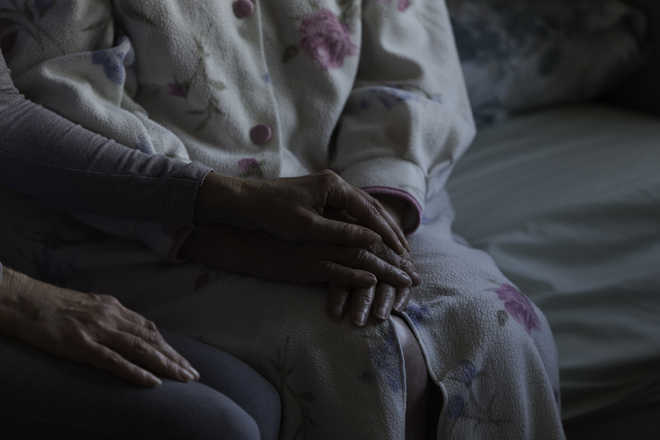
Time to bond: Stress is a crucial factor for both the patient and the caregiver
Jasmin Pannu
Their entire lives changed just in the flash of a second. As machines beeped and monitors buzzed, the whole household turned into a medical care unit.
We were never born to be alone. The succor and warmth of a family has always led us to achieve our dreams and face struggles with a smile. However, there are times that can test the strength of the family bond, right to the hilt. Everything changes once we have a patient at home, with all our energies and efforts redirected towards their management.
Labour of love
Health and vigour in good times often mislead us into a false security and we remain unaware of what might be in store for us.
“We often conveniently forget that we too will be this old sometimes and will face the same ill-health,” says Varun Sharma, a Ludhiana-based businessman who is serving his 96-year-old mother at home. “However, it has been a sea change for our family to manage her as a patient as she was always a very active member of the household. Sometimes it is very disheartening for us to see her dependent on us, yet, we are trying our best to savour our moments with her as she also suffers from major bouts of memory loss and mental confusion,” he laments.
A similar sentiment is shared by Rajan Kapoor, whose 78-year-old father suffered a brain haemorrhage three months ago and is now under intensive home-based intensive medical care. “Our entire household routine revolves around him now, right from food to recreation and socialising,” says the Chandigarh-based businessman. “The illness in the family means that every person at home has to take on a specific role. While my wife is constantly monitoring his diet, my mother is just concentrating on spending time with him to ensure he doesn’t feel lonely,” he reasons.
Talking of how the routine in his household has drastically changed, Varun Sharma adds, “In addition to the basic care, we have made time slots of when each one of us is supposed to spend time with her, regardless of our own personal schedules.” This, he explains, makes sure that his ailing mother doesn’t feel excluded or left out of their lives. “Love and warmth are the only way out,” he concludes.
Stress invasion
Though the Indian society still values the family ties and bonds, yet human nature gives in at times, as caregivers also tend to lose patience and get stressed out. “I often feel frustrated due to the restrictions on my personal life and liberty to travel,” says Serena Chawla, a homemaker who is in-charge of her ailing in-laws. In fact, she adds, “I often feel very helpless as I can’t do much to alleviate their pain or discomfort, with my mother-in-law being severely osteoporotic and my father-in-law just having undergone a brain surgery.”
Here, stress actually becomes the most crucial factor for both the patient as well as the caregiver. “My father often feels embarrassed as we tend to his daily needs of hygiene and also gets irritated with the attendants as he has to abide by their instructions,” quips Rajan Kapoor, adding that it can often become a difficult situation to handle temperaments.
“Mine is already a sensitive relationship with my in-laws and they tend to get very sensitive and edgy, especially when they are feeling excessively unwell. I have to behave extremely mature and balanced, otherwise the whole atmosphere in the household becomes very unpleasant,” remarks Serena, whose husband travels a lot, almost making her the primary caregiver.
Caretaker burnout
“It is natural for one to lose patience and get exhausted, in spite of the best of your best intentions,” states Chitvan Singh, a Ludhiana-based clinical psychologist. “You really don’t have to feel guilty for feeling exhausted as the caregivers have often been seen to get depressed or ill themselves,” she warns. Instead, it is important to talk it out, seek help, sleep enough and eat well in order to be fit enough to look after the sick family members. “After all, you are just a normal individual, not a superhuman,” she winds up.



























